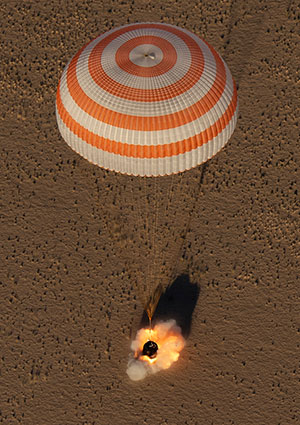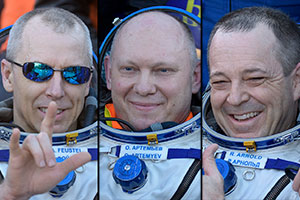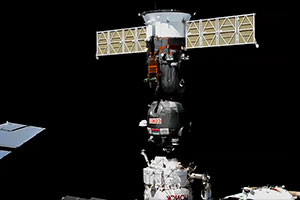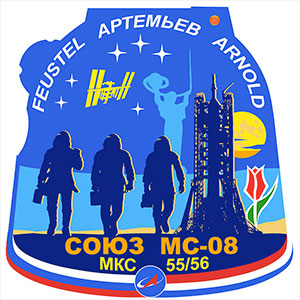October 4, 2018 — Two U.S. astronauts and a Russian cosmonaut kicked off World Space Week on Thursday (Oct. 4) by returning home from a six-month stay on the International Space Station.
Drew Feustel and Ricky Arnold, both of NASA, and Oleg Artemyev of the Russian federal space agency Roscosmos, touched down aboard Russia's Soyuz MS-08 spacecraft on the steppe of Kazakhstan, southeast of the town of Dzhezkazgan, at 7:44 a.m. EDT (1144 GMT or 5:44 p.m. local Kazakh time). The landing coincided with the 61st anniversary of the launch of the world's first satellite, Sputnik, by the former Soviet Union and the start of the Space Age.
The gumdrop-shaped Soyuz descent module was met on the ground by Russian recovery forces to assist Artemyev, Feustel and Arnold exit their capsule and begin their readjustment to gravity. The trio seemed to be in good spirits as they breathed in fresh air for the first time in 197 days, with Artemyev even enjoying a large carrot and the scents from a cantaloupe and large squash.
Artemyev, Feustel and Arnold began their journey back to Earth about three hours before their landing with the undocking of Soyuz MS-08 from the space station's Poisk module at 3:57 a.m. EDT (0757 GMT). Their departure marked the official end of Expedition 56, the station's 56th crew contingent since Expedition 1 took up residency in November 2000.
Before departing the vicinity of the space station, the Soyuz MS-08 crew flew a fly-around of the complex so that Feustel, temporarily re-positioned in the Soyuz's orbital module, could take photographs in preparation for the 20th anniversary of the launch of the first component of the International Space Station in November.
Sergey Prokopyev of Roscosmos, NASA astronaut Serena Auñón-Chancellor and Alexander Gerst of the European Space Agency (ESA), who arrived at the station on June 8 and served as members of the Expedition 56 crew under Feustal's lead, are still aboard the orbiting outpost.
Feustel, who turned over control to Gerst on Wednesday (Oct. 3), presented his successor with a token of their common field of study and time on the International Space Station (ISS).
"I would like to offer you something to remember the bond that we both share as geophysicists," Feustel told Gerst during the brief change of command ceremony. "This is an anorthosite phenocryst from Mount Erebus in Antarctica. I know you have many of these and some have flown in space, but surely not one given by a fellow geophysicist and fellow ISS commander while actually in space."
Feustel also gifted Gerst with an Expedition 56 medallion and continued a tradition by passing him a symbolic key to the space station, a tool used to open and close the hatch of the Soyuz.
"Thanks for 1,850 orbits of friendship and great achievements together," said Gerst, addressing Feustel, Arnold and Artemyev. "Together we achieved a lot. We grew plants, we mixed concrete, we tested cancer meds, we grew protein crystals, we checked out granules, we measured the Earth's magnetic field, we generated a Bose Einstein condensate, we tested metal alloys, and many, many more things."
"With over 350 experiments credited to the expedition, we should all be proud of our accomplishments together," said Feustel.
In addition to their science research, the Expedition 55/56 crewmates performed four extravehicular activities (EVAs). Feustel and Arnold exited the station three times together in March, May and June to configure communications equipment, relocate a failed pump unit and continue the preparations for the future arrival of U.S. commercial crew spacecraft. Their first outing marked the 100th spacewalk performed by crew members living on board the ISS.
In August, Artemyev and Prokopyev conducted an EVA to deploy four small satellites, reconfigure antennas on the Zvezda service module and retrieve and install experiments.
Inside the space station, Feustel played the first tennis match in space as part of an outreach project with the U.S. Tennis Association and he recorded a music video with the Canadian rock band The Tragically Hip. Arnold, a former middle school mathematics and science teacher, continued and concluded NASA's Year of Education on Station, including recording lessons that Teacher-in-Space Christa McAuliffe had planned to conduct on board space shuttle Challenger in 1986.
This was Artemyev's and Arnold's second spaceflight and Feustel's third. Artemyev has now logged 366 days in space, Arnold has spent 210 days off Earth and Feustel has accumulated 226 days living and working on orbit.
Now on Earth, the three Soyuz MS-08 crewmates will return to their respective space agencies after a brief flight by helicopter to the Kazakh town of Karaganda for a traditional welcoming ceremony. From there, Artemyev will depart for Star City, outside of Moscow, while Feustel and Arnold will return by NASA jet to the Johnson Space Center in Houston.
Two more Expedition 57 crew members — Aleksey Ovchinin of Roscosmos and NASA astronaut Nick Hague — are scheduled to launch to the space station on board Soyuz MS-10 on Oct. 11.
Soyuz MS-08 was the 54th Russian Soyuz spacecraft to fly to the International Space Station. It traveled a total of 83.4 million miles (134 million kilometers) over the course of 3,152 orbits of Earth. |
|

The Soyuz MS-08 spacecraft lands on the steppe of Kazakhstan on Oct. 4, 2018 after 195 days at the space station. (NASA/Bill Ingalls)

Soyuz MS-08 crewmates Drew Feustel, Oleg Artemyev and Ricky Arnold are seen after landing on Oct. 4, 2018. (NASA/Bill Ingalls)

Soyuz MS-08 undocks from the International Space Station's Poisk module to return to Earth after 197 days in orbit. (NASA TV)

Soyuz MS-08 crew patch. (Roscosmos/Spacepatches.nl) |
